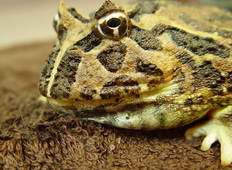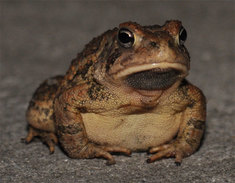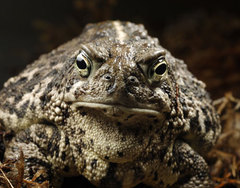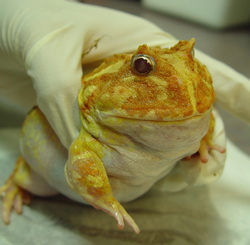Short Tongue Syndrome or Hypovitaminosis A in Frogs and Toads
by Justine Hammond, DVM
for Chicago Exotics Animal Hospital
for Chicago Exotics Animal Hospital

Frogs and toads are susceptible to a number of nutritional imbalances based on inadequate or excessive levels of vitamins and minerals in their diets. One recently recognized disease is hypovitaminosis A or low levels of vitamin A. In 2002, a report was published by Pessier et al. describing a population of captive Wyoming Toads. These toads are endangered and were enrolled in a captive propagation program with the intent of re-release into the wild. The toads in captivity seemed to be unable to reach their prey items with their tongue. They would posture and open their mouth and extend their tongue but left the prey item unharmed. This disease became known as “short tongue syndrome.” As this syndrome was further studied it became evident that the problem was not that the tongue was deformed or too short but that the mucus glands were being clogged with an overgrowth of cells in the ducts and therefore their tongues actually were not sticky enough to catch prey. This overgrowth of cells lining the mucus gland ducts is called squamous metaplasia and is due to a vitamin A deficiency. Vitamin A is necessary for bone metabolism, skin integrity and eyesight among other functions.
 Pictured here is a healthy toad.
Pictured here is a healthy toad.
Hypovitaminosis A in frogs and toads can also cause eyelid swelling, weight loss, fluid build-up in the abdominal cavity, increased susceptibility to infection and sudden death, in addition to the signs found in short-tongue syndrome.
There has been evidence that oral vitamin A, topical vitamin A and dietary supplementation of vitamin A all may increase levels in deficient animals. However, ongoing research is focusing on which method of treatment is most effective in increasing these levels quickly and consistently.
There has been evidence that oral vitamin A, topical vitamin A and dietary supplementation of vitamin A all may increase levels in deficient animals. However, ongoing research is focusing on which method of treatment is most effective in increasing these levels quickly and consistently.
 A captive raised Wyoming toad
A captive raised Wyoming toad
Preventing this syndrome focuses on appropriate captive diets. Understanding captive amphibian dietary recommendations can be confusing and most owners feed one or two types of prey items. This type of feeding cannot provide all of the nutrients that these animals need. Imagine if you only ate two food items, like potatoes and grapes, for your entire life. Despite the fact that these are both fairly healthy food items, you would be terribly nutritionally deficient over time. Based on this scenario and the fact that feeding a wide variety of insect prey to our amphibians can be logistically difficult, supplementation with vitamins and minerals is suggested (see amphibian nutrition sheets). Crickets and mealworms are not adequate sources of vitamin A alone. Mammalian prey items have high vitamin A content but only larger amphibians can ingest these items. There are also considerations to be made when supplementing animals with vitamin A. Vitamin A is only active within the first 6 months of opening powdered supplement jars and only if stored in a cool, dry environment. To the authors’ knowledge, there is no evidence (yet) that amphibians can metabolize and use the precursors of vitamin A (carotenoids) so use a product that has vitamin A in it and not just beta- carotene. For specific dietary suggestions for your amphibian, see our care sheets (here). We always recommend annual wellness exams for amphibian pets. The veterinarian can help to ensure that you are on the right path in terms of diet, housing and environment for your pet, in addition to checking for current medical problems.

References
If you have any questions, please feel free to call us at 847-329-8709.
- Densmore, CL, Green, DE. (2007) Diseases of Amphibians. ILAR: Vol 48, No 3, pp. 248.
- McWilliams, DA. Nutritional Recommendations for some Captive Amphibian Species (Anura and Caudata), 2008. Accessed by the internet at: http://www.caza.ca/media/Pdf/Conservation/member%20resource%20page/amphibian_nutrition_report_april_2008.pdf
- Sim, RR, Sullivan, KE, Valdes, EV, et al. (2010) A Comparison of Oral and Topical Vitamin A Supplementation in African Foam- Nesting Frogs ( Chiromantis xerampelina). Journal of Zoo and Wildlife Medicine: September 2010, Vol 41, No 3, pp. 456- 460.
- Wright, K. Overview of Amphibian Medicine In: Mader, D. Reptile Medicine and Surgery, St Louis, 2006, Elsevier Publishing.
If you have any questions, please feel free to call us at 847-329-8709.
